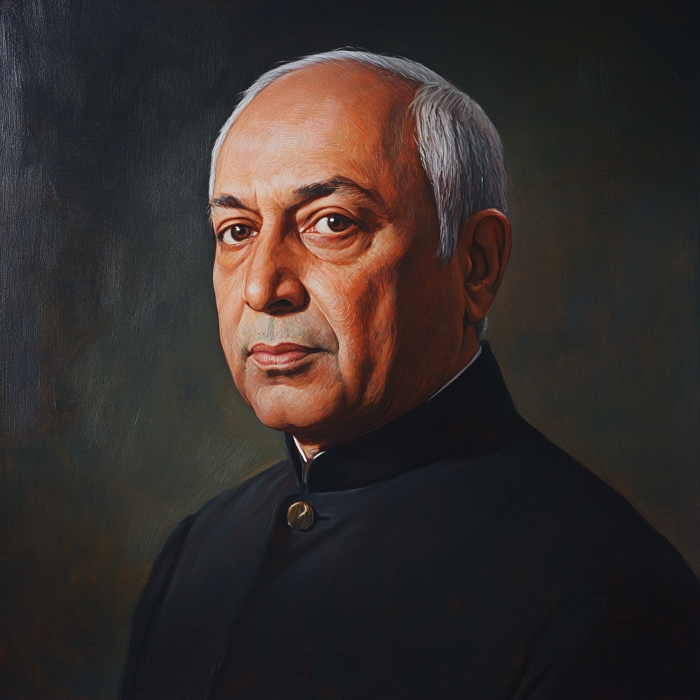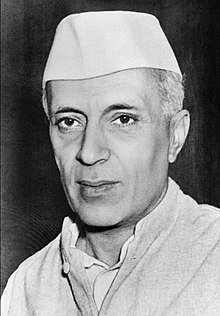


Jawaharlal Nehru (1889–1964) was an Indian nationalist leader, freedom fighter, and the first Prime Minister of India. He was a key figure in the Indian struggle for independence and a close associate of Mahatma Gandhi. Nehru played a central role in shaping India’s post-independence political, economic, and social structure, and was instrumental in laying the foundation of a secular, socialist, and democratic republic. Known affectionately as Pandit Nehru or Chacha Nehru, he was also a strong advocate for education and the upliftment of children and youth.
Birth and Family Background: Jawaharlal Nehru was born on November 14, 1889, in Allahabad, India, into a wealthy and prominent Kashmiri Brahmin family. His father, Motilal Nehru, was a successful lawyer and an important leader in the Indian National Congress (INC), while his mother, Swarup Rani Nehru, came from a well-respected family. Nehru's early years were spent in a privileged environment, and he received a first-class education.
Education in England: In 1905, Nehru went to Harrow School, one of England's leading public schools. He later studied at Trinity College, Cambridge, where he graduated with a degree in natural sciences. He then pursued his legal studies at the Inner Temple in London and was called to the bar in 1912. Nehru's education in England exposed him to Western political thought, including socialism and liberalism, which would heavily influence his worldview.
Return to India and Entry into Politics: After completing his education, Nehru returned to India in 1912 and started practicing law in Allahabad. However, he soon became involved in the growing movement for Indian independence, inspired by his father's political activities and the rising tide of anti-colonial sentiment. Nehru joined the Indian National Congress and began actively participating in India's struggle against British colonial rule.
Influence of Mahatma Gandhi: In 1919, Nehru met Mahatma Gandhi, whose philosophy of non-violence and civil disobedience deeply influenced him. Nehru joined Gandhi’s Non-Cooperation Movement in 1920 and dedicated himself fully to the cause of Indian independence. He traveled extensively across India, mobilizing the masses and spreading the message of freedom.
Imprisonments: Throughout the struggle for independence, Nehru was imprisoned numerous times by the British authorities for participating in various civil disobedience movements. He spent nearly a decade in prison during his lifetime, where he used his time to write extensively on history, politics, and philosophy. Some of his most famous works, including "The Discovery of India" and "Glimpses of World History", were written while he was incarcerated.
Role in the Congress Party: Nehru quickly rose to prominence within the Indian National Congress, becoming one of its key leaders and a close confidant of Gandhi. He was elected President of the Congress several times, starting in 1929, when he presided over the Lahore session of the Congress that declared complete independence (Purna Swaraj) as the goal of the Indian freedom movement. Nehru's vision of a secular and democratic India aligned with the Congress's objectives, and he played a significant role in shaping the party's policies.
Quit India Movement: In 1942, Nehru was a prominent leader of the Quit India Movement, a mass protest launched by Gandhi demanding an end to British rule in India. The movement led to the imprisonment of most Congress leaders, including Nehru, who was detained until 1945. Despite the challenges, Nehru remained resolute in his commitment to achieving independence.
Negotiations and Independence: In the post-World War II years, the British government, weakened by the war, began negotiations to transfer power to Indian leaders. Nehru was a key figure in these negotiations, alongside Sardar Vallabhbhai Patel, Mahatma Gandhi, and Mohammed Ali Jinnah of the Muslim League. Despite efforts to keep India united, rising communal tensions led to the partition of India and the creation of Pakistan.
Partition and Violence: On August 15, 1947, India gained its independence, but the partition of the country led to widespread violence and communal riots, resulting in the death of hundreds of thousands and the displacement of millions of people. Nehru was deeply troubled by the violence and worked tirelessly to restore peace and provide relief to those affected by the partition.
First Prime Minister (1947–1964): Jawaharlal Nehru became the first Prime Minister of independent India and held office from 1947 until his death in 1964. He played a crucial role in shaping the newly independent nation, focusing on unity, economic modernization, social reform, and the establishment of democratic institutions.
Constitutional Vision: Nehru worked closely with B. R. Ambedkar and the Constituent Assembly in drafting a new constitution for India, which came into effect on January 26, 1950, marking the establishment of India as a sovereign democratic republic. The Constitution enshrined principles of secularism, fundamental rights, democracy, and social justice, reflecting Nehru's vision for a modern India.
Economic and Industrial Policies: Nehru was a proponent of socialism and adopted a mixed economy model that combined state-led economic planning with elements of private enterprise. He established the Planning Commission and launched a series of Five-Year Plans to promote industrialization, infrastructure development, and agricultural growth. Nehru prioritized the development of key industries, including steel, energy, and manufacturing, and established institutions such as the Indian Institutes of Technology (IITs) to promote technical education.
Non-Alignment and Foreign Policy: Nehru was a founding leader of the Non-Aligned Movement (NAM), which sought to maintain neutrality during the Cold War between the United States and the Soviet Union. His foreign policy emphasized peaceful coexistence, non-alignment, and support for anti-colonial struggles in Asia and Africa. He established diplomatic relations with both the United States and the Soviet Union, seeking to balance India’s relationships with the major powers while maintaining its independence.
Panchsheel and Relations with China: Nehru advocated the Panchsheel principles, a set of five principles aimed at maintaining peaceful relations between nations, which he signed with China in 1954. However, his belief in peaceful coexistence was challenged by the Sino-Indian War of 1962, when China invaded disputed territories along the Himalayan border. The war was a major setback for Nehru, as it exposed India’s military vulnerabilities and strained India-China relations.
Social Reforms: Nehru was a champion of social reforms, advocating for the upliftment of the marginalized sections of society. He worked to abolish discriminatory practices, such as untouchability, and promoted women's rights by supporting initiatives like the Hindu Code Bill, which reformed laws related to marriage, inheritance, and divorce, giving greater rights to women. He also laid the foundation for India's commitment to universal education and launched programs to expand primary education and adult literacy.
Architect of Modern India: Jawaharlal Nehru is often referred to as the architect of modern India for his role in laying the foundation of a secular, socialist, and democratic nation. His vision for an inclusive society that embraced diversity and social justice has had a lasting impact on India’s political and social structure. He was instrumental in establishing democratic institutions that would sustain India as the world's largest democracy.
Promoter of Science and Technology: Nehru believed in the power of science and technology to drive India’s development. He established institutions such as the Indian Institutes of Technology (IITs), Indian Space Research Organisation (ISRO), and several research institutes to promote scientific education and innovation. His efforts helped build a foundation for India’s progress in science, technology, and space exploration.
Non-Aligned Movement: Nehru’s role in founding the Non-Aligned Movement left a significant mark on global politics during the Cold War era. He was one of the prominent leaders, along with Josip Broz Tito of Yugoslavia and Gamal Abdel Nasser of Egypt, who championed the idea of maintaining independence from both the United States and the Soviet Union, thereby helping newly independent nations navigate the global power struggle.
Children’s Day: Nehru was known for his affection for children, who called him Chacha Nehru. He believed that children were the future of the nation and emphasized the importance of education and development for them. His birthday, November 14, is celebrated in India as Children’s Day in recognition of his commitment to the welfare of children and his belief in nurturing young minds.
Controversies: Nehru's tenure was not without its challenges and controversies. His policies of centralized economic planning and state-led industrialization faced criticism for leading to inefficiencies, bureaucratic red tape, and a slow rate of economic growth, often referred to as the "Hindu rate of growth". Additionally, his handling of the Kashmir issue and the Sino-Indian War of 1962 drew criticism and exposed weaknesses in India’s defense and foreign policies.
Jawaharlal Nehru was a visionary leader, freedom fighter, and the architect of modern India. His commitment to building a democratic, secular, and socialist nation was instrumental in shaping the path that India would follow after gaining independence. As the country’s first Prime Minister, he faced the immense challenge of uniting a diverse nation, building its institutions, and setting it on a course for development and modernization.
Nehru's emphasis on science, education, social justice, and democratic governance remains an enduring legacy that continues to influence India today. Despite facing criticism for some of his policies, his role in shaping India’s political, social, and economic landscape was profound. His ideas on secularism, democracy, and international cooperation continue to resonate, and his contributions to India’s development have cemented his place as one of the country’s most important and respected leaders.

We use cookies
We use cookies and other tracking technologies to improve your browsing experience on our website, to show you personalized content and targeted ads, to analyze our website traffic, and to understand where our visitors are coming from. Privacy Policy.